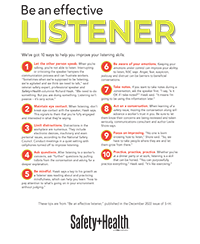Be an effective listener
10 tips to help sharpen your skills

Photos: mihailomilovanovic/iStockphoto
When listening to other people speak, we tend to focus on the parts that are most relevant to us and our situations, and respond in kind.
Richard Hawk has an example.
During his presentation on listening, the veteran safety expert, professional speaker and Safety+Health columnist notes that most people listen to “talk about themselves.” For example, if he mentions his two grandchildren in a conversation, the other person most likely will talk about their own grandkids.
Although this kind of listening works for everyday conversation, for safety pros on the job, a higher level of listening is needed.
Effective listening can earn workers’ trust and improve worker safety by giving safety pros a better understanding of what’s happening on a jobsite or at a facility.
“That’s one of the most important things in your job as a safety pro – to know what’s going on in the field,” Hawk said.
Safety+Health columnist and popular motivational speaker Richard Hawk discusses this article with the magazine's editorial team on the December 2022 episode of Safety+Health's “On the Safe Side” podcast.
Workplace benefits
According to the National Safety Council’s Supervisors’ Safety Manual, the average supervisor spends about 70% of the workday communicating. Of that, 45% is spent listening.
How do you know if you’re a good listener? It’s easy, Hawk said.
“You know you’re doing it right by the fact that people come to you. People are willing to come to you and they’re also willing to confide in you. People long for somebody to listen.”
Communications consultant, speaker and professor Leslie Shore, author of the book “Listen to Succeed,” said the connection between worker and safety pro is paramount to everyone’s safety and health on the jobsite.
“The relationship is all about trust,” Shore said. “Their lives are in your hands. The worker needs to feel comfortable and needs to feel there’s a relationship to be able to say, ‘Hey, safety person, something is funky. This machine, I can’t put my finger on it, but there’s something that’s not quite right.’”
If you assure workers that a troublesome manufacturing line they’re concerned about will be inspected, “they feel heard,” Shore said. “They feel respected.”
Enhancing safety
Effective communication in work settings requires three times as much listening as talking, Shore said.
She recommends a “listen, speak, listen, listen” strategy. This can help you listen more and clarify what a worker is trying to communicate.
The first step is listening, then responding to the worker’s issue or concern. Follow that up by listening to their response, clarifying any questions and then listening again.
“When you’re listening, you don’t know whether you’re getting it all,” Shore said. “As the person who is listening, your responsibility is to take in what’s coming at you the way it was meant. You can’t go wrong by listening twice to the reframing of what they said or clarification.”
Hawk said that although talking might help us become better speakers and presenters, listening offers far more learning opportunities. “When I talk, I’m not learning. When you’re listening, you’re learning and improving.”
On a jobsite, effective listening allows for you to make accurate safety recommendations.
“Often we make recommendations that don’t apply or aren’t specific enough to what’s going on in the field,” Hawk said. “If you want to improve interaction with other humans, there’s no other skill that’s better, more important or stronger than listening.”
Post a comment to this article
Safety+Health welcomes comments that promote respectful dialogue. Please stay on topic. Comments that contain personal attacks, profanity or abusive language – or those aggressively promoting products or services – will be removed. We reserve the right to determine which comments violate our comment policy. (Anonymous comments are welcome; merely skip the “name” field in the comment box. An email address is required but will not be included with your comment.)


